- Home
- Rosamunde Pilcher
Coming Home Page 17
Coming Home Read online
Page 17
The meal, as described in the kitchen by Mrs Nettlebed, had not sounded exciting, but it was, in fact, delicious. The Shooter's stew was dark and rich, enhanced by fresh mushrooms and a winy sauce; the mashed potatoes were creamy and smooth…good for soaking up the thick gravy…and the cabbage, lightly dusted with grated nutmeg, was green and sweet and crisp as nuts. To drink there was water, or beer for the men. Nettlebed, having handed around the vegetables, and seen that all the glasses were filled, had withdrawn, soft-footed, from the room. Judith was relieved to see him go. She found it hard to ignore his chilling presence, and his cold regard was enough to make anybody use the wrong knife or fork, knock over a glass of water, or drop one's linen napkin on the floor.
So far, however, she had committed none of these crimes, and without Nettlebed lurking around the back of her neck, she was beginning to enjoy herself.
‘And how about yourself?’ the Colonel asked. ‘Are you going to manage on your own? Are you enjoying St Ursula's?’
She shrugged. ‘It's all right.’
‘What about school holidays?’
‘I'm going to live with my Aunt Louise.’
‘Where is that?’
‘In Penmarron. Near the golf course.’
It was at this moment that one of those inexplicable silences fell around the table…everybody coming to a pause in the general conversation. So when Judith added, ‘The house is called Windyridge,’ hers was the only voice.
Across the table, Loveday began to giggle.
‘What's the joke?’ her father asked.
‘I wouldn't call it Windyridge. I'd call it Fartyedge,’ whereupon she dissolved into shrieks of laughter, and would probably have choked on her stew, or done the nose-trick, had not the Colonel thumped her on the back, and so, by a whisker, saved the day.
Judith was both embarrassed and apprehensive, expecting a storm of reprimands, or, at the worst, a furious order to leave the room at once. Such language, and at the lunch table too.
But nobody seemed in the least shocked, just marvellously amused, and everyone around the table dissolved into mirth as though Loveday had made some brilliantly funny remark. Mary Millyway did murmur, ‘Oh, really, Loveday,’ but nobody, least of all Loveday, took the slightest bit of notice of her.
When she had stopped laughing, and wiped the tears from her cheeks with a tiny lace-edged handkerchief, Diana observed, sotto voce, ‘What a frightfully good thing Nettlebed wasn't in the room. Loveday, you really are naughty, but you're so funny I suppose it doesn't matter.’
The first course was finished, and the bell rung for Nettlebed to return and clear the plates. The pudding was then served. Syrup tart and bottled plums and Cornish cream. The Colonel, having done his duty by his daughter's guest, now turned his attention to Loveday, who had a great deal to tell him about the iniquities of school, the unfairness of Deirdre Ledingham, the impossibility of learning algebra, and the hatefulness of Matron.
He listened to this routine moaning with polite attention, neither arguing nor interrupting, and Judith guessed that he had probably heard it all before. Her respect for him grew, because he clearly knew that none of Loveday's complaints, if analysed, would prove to have the slightest substance. Perhaps as well he had accepted the fact that Loveday, come hell or high water, was a survivor, and if she couldn't get her own way by wheedling and charm, she would resort to the depths of blackmail. Like running away from her first boarding-school, and refusing, on pain of death, to return.
Judith spooned cream over her syrup tart and turned her attention to other conversations. Tommy Mortimer and Diana were laying plans for London; for the coming Season, for the Chelsea Flower Show, and Wimbledon and Henley and Ascot. It made fascinating listening.
‘I've got tickets for the Centre Court and the Royal Enclosure.’
‘Oh, heaven. I shall have to buy some hats.’
‘How about Henley?’
‘Oh, let's go. I always adore Henley. All those dear old codgers in their pink ties.’
‘We'll get a party together. When are you next coming up to town?’
‘I hadn't really thought. Perhaps in a couple of weeks. I'll drive up in the Bentley. I have to order a clothe or two, and have fittings and such. And find a decorator to do something about Cadogan Mews, before Athena gets back from Switzerland.’
‘I know a marvellous man. I'll give you his number.’
‘How kind. I'll let you know when I'm on my way.’
‘We'll do a theatre, and I'll give you dinner at the Savoy.’
‘Heavenly.’ All at once, Diana became aware of Judith. She smiled. ‘I'm sorry, we're being boring, laying plans. And this is your day, and nobody's talking to you. Now, tell me, what do you want to do this afternoon?’ She raised her voice slightly, commanding attention. ‘What does everybody want to do this afternoon?’
Loveday said, ‘I want to ride Tinkerbell.’
‘Darling, that sounds a little selfish. What about Judith?’
‘Judith doesn't care for riding. She doesn't like horses.’
‘In that case, perhaps it would be kind to do something that she wants to do.’
‘I don't mind,’ Judith said, fearing some sort of argument, but Loveday didn't seem to care about arguments or rows or anything.
‘Oh, Mummy, I really want to ride Tinkerbell. And you know it's not good for her not being regularly exercised.’
‘I don't want you going out on your own. Perhaps Pops can come with you.’
‘She won't be on her own,’ the Colonel told her. ‘Young Walter's working down at the stables this afternoon. I'll send word to him to have the horses saddled up and ready.’
‘But, Pops, why can't you come with me?’
‘Because, my pet, I must go and do some work. I've letters to write, and calls to make and an appointment with Mudge at four o'clock.’ Down the table he indulgently regarded his wife. ‘And how are you going to spend the rest of the day?’
‘Oh, Tommy and I are all arranged for. I've asked the Parker-Browns over for some bridge. But that still doesn't solve the problem of our guest…’ Judith felt dreadfully embarrassed, as though she had become, all at once, a tiresome nuisance, and it was made even worse by Diana turning to Mary Millyway. ‘Perhaps, Mary…?’
She was, however, interrupted by Jeremy Wells who, up to now, had kept out of the discussion. He said, ‘Why don't I do something for Judith? We'll all go down to the stables together, and she and I will take the dogs and go on down to the cove.’ He smiled at Judith and she was filled with gratitude, because he had seen her predicament and come, so easily, to her rescue. ‘Would you like to do that?’
‘Yes, I'd love to. But you don't need to bother; I mean, I'm all right on my own.’
Diana, clearly thankful to have everything settled, overrode her feeble objections. ‘Of course you can't be on your own. It's a lovely idea, provided Jeremy's parents won't mind him spending the entire day here. After all, you are only down for the weekend, and they'll be longing to have a sight of you…’
‘I'll go back after tea. Father's on call today anyway. But we'll have the evening together.’
Diana beamed. ‘Well, isn't that splendid? Everything settled and everybody happy. Judith, you'll love the cove, our own darling little beach. But put on a jacket or get Mary to lend you an extra jumper, because it's always cold down by the sea. And, Loveday, don't forget your hard hat. Now…’ She pushed back her chair. ‘Why don't we all go to the drawing-room and have a cup of coffee.’
The invitation, it seemed, did not include the two girls. When the grown-ups had gone, they stayed in the dining-room to help Mary and Nettlebed clear the table, and only then went upstairs to prepare for their expeditions. Extra pullovers were produced for both of them, and Loveday's jodhpur boots, her string gloves, and her hard hat all run to earth.
She said, ‘I hate this hat. The elastic's too tight under my chin.’
But Mary was adamant. ‘It's nothing of the sort,
and you're to keep it on.’
‘I don't see why I should have to wear it. Lots of girls don't.’
‘You're not lots of girls, and we don't want you bashing your brains out on a rock. Now, here's your crop, and two toffees for your pockets.’ She took a glass jar from the mantelpiece and doled out a toffee each.
‘What about Jeremy and Walter?’ Loveday asked, and Mary laughed, and gave her two more, and sent her on her way with a pat on the behind. ‘Off with you,’ she said. ‘And when you get back, I'll have tea ready for you both, here, by the fire.’
Like puppies escaping, they galloped downstairs and along the passage which led to the drawing-room door. Outside this, Loveday paused. ‘We won't go in,’ she whispered, ‘otherwise we'll get caught up.’ She opened the door and put her head around it. ‘Jeremy! We're ready.’
‘I'll meet you in the gunroom,’ came his voice. ‘In one minute. I'll bring Pekoe with me. Tiger's there already, drying off after this morning.’
‘Right. Have lovely bridge, Mummy. See you later, Pops.’ She closed the door. ‘Come on, we'll go to the kitchen first and get some sugar lumps for Tinkerbell and Ranger. And if Mrs Nettlebed gives us sweets, don't tell her Mary's already given us toffees.’
Mrs Nettlebed did not give them sweets, but tiny fairy cakes fresh out of the oven, which she had just made for drawing-room tea. They were warm, and too good to keep, so they ate them then and there, raided the sugar basin, and went on their way. ‘Have a good time now…’ Mrs Nettlebed's voice floated after them.
The back passage led to the gunroom, which smelt pleasantly of oil, and linseed, and old mackintoshes and dog. Locked cabinets of guns and rods stood all around the wall, and gaffs and waders and rubber boots had their own special racks. Tiger, snoozing in his bed, had heard them coming and was up and ready for them, and raring to go for another bit of exercise. He was a huge black Labrador, with a square nose and dark eyes and a tail that wagged like a piston.
‘Hello, darling Tiger, how are you? Have you had a lovely morning finding dead rabbits and shot pigeons?’ Tiger made pleased noises in the back of this throat. He was enormously friendly, which was a good thing, because he was too big and strong to be anything else. ‘And are you going to come for a lovely walk?’
‘Of course he is,’ said Jeremy, coming through the door behind them with Pekoe under his arm. He put Pekoe down on the floor, and while he pulled on his jacket, which he took from a hook on the wall, the two dogs made much of each other, Tiger nuzzling at the little Peke, and Pekoe lying on his back and waving his paws, as though he were swimming upside down.
Judith laughed. ‘They look so funny together.’
‘Don't they just.’ He grinned. ‘Come on then, girls, no hanging about. Walter will be waiting.’
They trooped out, by way of a second door which led into the cobbled yard where the white pigeons fluttered around their dovecote. It was a bit like walking out into winter, and Judith was taken aback by the cold of the air. Indoors, inside the centrally heated house, so filled with pale sunshine and the scent of flowers, it was easy to be lulled into the belief that warm spring had truly arrived, but a nip in the wintry air instantly dispelled any such illusion. It was still bright, but there was a sharp east wind coming in off the sea, from time to time blowing dark clouds across the face of the sun. Judith reminded herself that it was, after all, still only the middle of February, but, despite her extra sweater, she shivered. Jeremy noticed the shiver and said, in a comforting manner, ‘Don't worry. Once we get moving you'll be as warm as toast.’
The stables lay a little way from the house, screened from sight by a coppice, discreetly landscaped, of young oak trees. A gravelled roadway led towards these, and as they approached, the stables came into view, purpose-built and very trim, forming three sides of a square, and with a yard in the middle. In this yard, the two mounts were ready and waiting, already saddled up and tethered to iron rings set in the wall. Tinkerbell and Ranger. Tinkerbell was a charming little grey pony, but Ranger was a great bay, seeming, to the wary Judith, the size of an elephant. He looked frighteningly strong, with powerful quarters, and muscles fairly rippling beneath his polished, groomed coat. Approaching, she decided to keep her distance. She would pat the pony, and even feed it a lump of sugar, but would give the power-house of the Colonel's hunter a very wide berth.
A young man stood with the animals, engaged in tightening the girth strap of the little grey. He saw them coming, finished his task, slapped down the saddle-flap and stood waiting, with a hand resting on the pony's neck.
‘Hello, Walter,’ Loveday called.
‘Hello, there.’
‘You're all ready! Did you know we were coming?’
‘Mr Nettlebed sent young Kitty down with word.’ He ducked his head at Jeremy. ‘Hello, Jeremy. Didn't know you were down.’
‘Got a weekend off. How are things with you?’
‘Oh, not too bad. Coming out with us, are you?’
‘No, not today. We're going down to the cove. Taking the dogs. This is Loveday's friend, Judith Dunbar.’
Walter turned his head slightly, and nodded at Judith. He said, ‘Hello.’
He was an extraordinarily good-looking young man, slim and dark and sunburnt as a gipsy, with black hair that covered his head in curls, and eyes dark as coffee beans. He wore corduroy breeches, a thick shirt striped in blue, and a leather waistcoat. Around his brown neck was knotted a yellow cotton handkerchief. What age was he? Sixteen, or seventeen? But he looked older, totally mature, and already sported a man's dark shadow of a beard. He made Judith think of Heathcliff in Wuthering Heights, and she could perfectly well see why Loveday was so keen to spend her afternoon riding Tinker-bell. Even Judith could understand the lure of the horse if one was to have the dashing companionship of Walter Mudge.
They stood and watched them mount. Walter eschewed the offer of a leg-up, and swung himself up into the saddle with an effortless grace that suggested that he might, just slightly, be showing off.
‘Have fun,’ Judith told Loveday.
She raised her crop. ‘You too.’
Hooves clattered across the yard, and then changed sound as the horses reached the gravelled road. In the bright, cold light, the little entourage made an attractive sight. They broke into a trot, disappeared around the oak coppice. The hoof-beats faded.
‘Where will they go?’ Judith asked.
‘Probably down the lane to Lidgey, and then on up to the moor.’
‘It makes me wish I liked horses.’
‘You either like them, or you don't. Come on, it's too cold to stand.’
They went the way that the riders had taken, and then turned off to the right, where the path sloped down through the gardens towards the coast. The dogs shot ahead and were soon lost to view. ‘They won't get lost, will they?’ Judith, feeling responsible for their well-being, was anxious, but Jeremy reassured her.
‘They know this walk as well as anybody. By the time we've reached the cove, they'll be there, and Tiger will already have had a swim.’
He led the way and she followed, along a winding gravelled path which led in the direction of the sea. The formal lawns and flower-beds were left behind them. They passed through a small wrought-iron gate, and the path narrowed and plunged downwards into a jungle of semi-tropical vegetation; camellias, late-flowering hydrangeas, stately rhododendron, lush clumps and thickets of bamboo, and tall-stemmed palms, their trunks matted with what looked like very thick black hair. High overhead, bare branches of elm and beech soughed in the wind, and were filled with hosts of cawing rooks. Then a stream appeared from the undergrowth of creeping ivy and moss and fern, and bubbled and tumbled its way down a rocky bed, alongside where they walked. From time to time the path crossed and then re-crossed the flowing water, by means of ornamental wooden bridges, contrived in designs that were vaguely oriental and made Judith think of willow-pattern plates. The running water and the wind in the trees made the only sound; footstep
s were deadened by a thick compost of dead leaves, and only when they crossed the bridges did the wooden planking ring with their tread.
Over the last bridge, Jeremy paused, waiting for Judith to catch up. There was still no sign of the dogs.
‘How are you doing?’
‘All right.’
‘Well done. Now we come to the tunnel.’
He set off once more. She looked and saw that, ahead, the sloping path plunged into a cavern of gunnera, that monstrous prickly-stemmed plant, with leaves large as umbrellas. Judith had seen gunnera growing before, but never in such daunting profusion. They stood there, sinister as creatures from another planet, and it took a small effort of courage to duck her head and follow her guide, and in the tunnel the light from the sky was shut away. It was like being underwater, so damp was everything, so aqueous and green.
She scrambled to keep up with him, her feet slithering on the steepening path. She raised her voice. ‘I don't like gunnera,’ she told him, and he looked back, to smile over his shoulder.
‘In Brazil,’ he told her, ‘they use the leaves as rain shelters.’
‘I'd rather be wet.’
‘We're nearly out of it now.’
And indeed, moments later, they emerged from the primeval gloom of the tunnel and stood once more in the glittering light of the bright winter afternoon. And Judith saw that they had come to the rim of a disused stone quarry. The path turned into a zigzag flight of roughly hewn steps which led to the foot of this. The stream, which had never been out of earshot, now appeared once more, to fling itself over the edge of the cliff in a sparkling waterfall, pouring down into a rocky crevasse, emerald-green with moss and fern, and misted with damp. The sound of it filled her ears. The walls of the quarry were hung with mesembryanthemum; its floor, littered with rocks and boulders, had become, over the years, a wild garden of bramble and bracken, tangled honeysuckle, ragged robin and butter-yellow aconites. The air was sweet with the almond-scent of gorse, and as well, the cool tang of seaweed, and she knew that they were close, at last, to the beach.

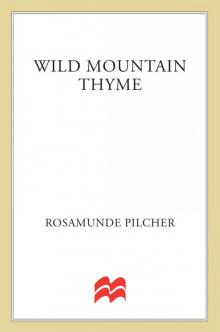 Wild Mountain Thyme
Wild Mountain Thyme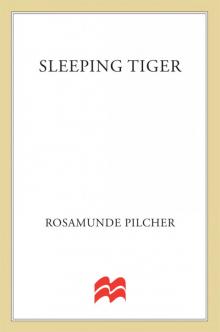 Sleeping Tiger
Sleeping Tiger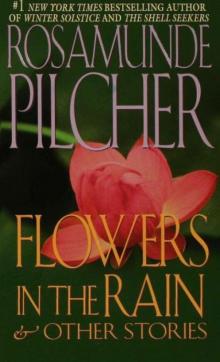 Flowers in the Rain & Other Stories
Flowers in the Rain & Other Stories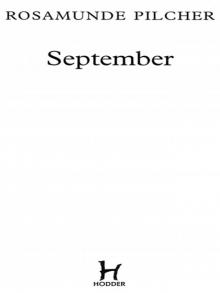 September
September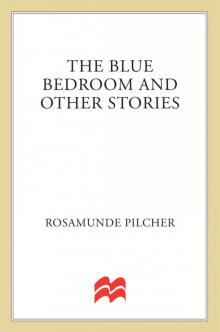 The Blue Bedroom: & Other Stories
The Blue Bedroom: & Other Stories The Carousel
The Carousel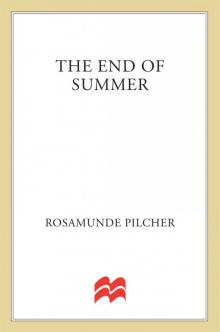 The End of Summer
The End of Summer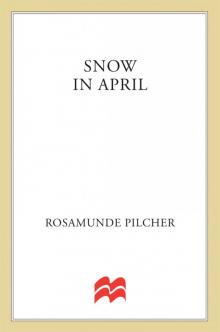 Snow in April
Snow in April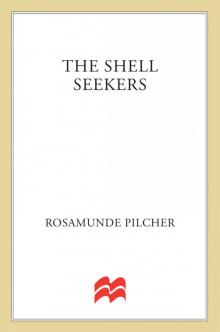 The Shell Seekers
The Shell Seekers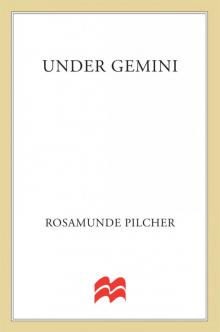 Under Gemini
Under Gemini The Empty House
The Empty House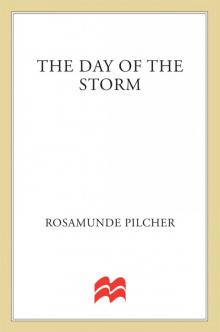 The Day of the Storm
The Day of the Storm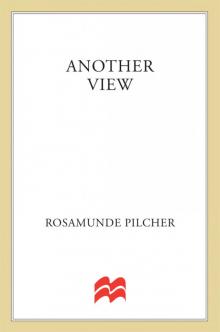 Another View
Another View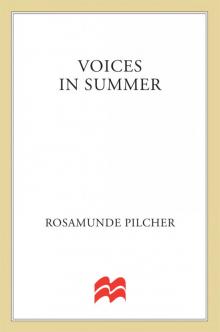 Voices in the Summer
Voices in the Summer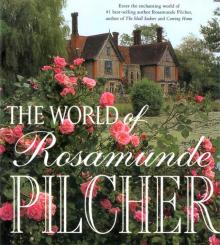 The World of Rosamunde Pilcher
The World of Rosamunde Pilcher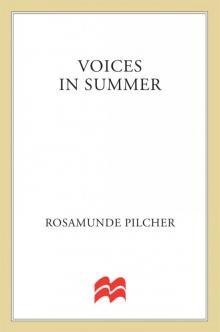 Voices In Summer
Voices In Summer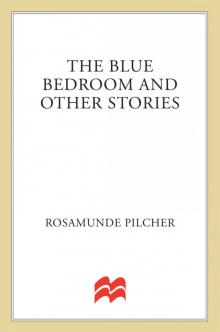 Blue Bedroom and Other Stories
Blue Bedroom and Other Stories